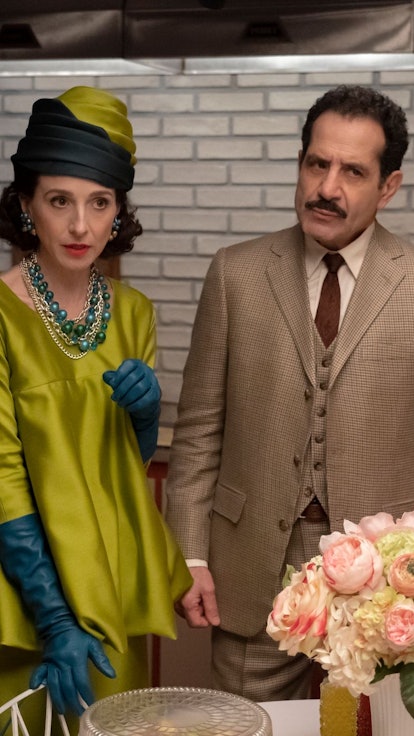This is a mystery only Rod Serling could solve: Does Amy Sherman-Palladino love The Twilight Zone or does she not-so-secretly think the '60s classic is overrated? In the second episode of The Marvelous Mrs. Maisel, Midge gets in a well-timed dig at The Twilight Zone, much to Abe's annoyance. "You know, this Twilight Zone sounds stupid," she tells her father.
Abe is aghast, and I would have been too had I not rewatched Gilmore Girls a concerning number of times. You see, this isn't the first time a Sherman-Palladino show has made a crack at The Twilight Zone's expense. Back in the Gilmore Girls Season 2 episode "It Should've Been Lorelai," Luke reveals himself to be firmly on team Outer Limits.
When Lorelai comments that "this whole morning has been a little Twilight Zone-y," Luke fires back with, "Or Outer Limits-y." He continues, "Great show, just as eerie, same era, but no one ever references it." Lorelai teases him about being a geek, but his comments stand as a reminder that The Twilight Zone wasn't the only great sci-fi show with killer twist endings that aired in the 60s.
Had this been the only jab at The Twilight Zone in a Sherman-Palladino show, then I would have just let it go, but then Midge served up a full-blown rant about the iconic TV show's penchant for reusing certain twist ending tropes. Now I suspect, series creator Sherman-Palladino (or someone close to her) has it out for Serling's masterpiece. Let's investigate, shall we?
Midge Isn't Impressed By The Twilight Zone's Twist Endings
Not only does she call the show stupid, Midge calls out The Twilight Zone's twist endings. "Either everyone's dead and they don't know it, or they think they're dead, but they're actually alive, or they're from outer space and they don't know it, or they think they're dead, but they're from outer space and they don't it!" she yells at her father.
And look, she's not wrong, but The Twilight Zone is foundational TV. "The Eye of the Beholder," "To Serve Man," "Time Enough at Last" — these are seminal episodes of television. Even "A Stop at Willoughby," the episode Abe is so eager to tell Midge and Rose about, is hugely affecting. So what gives? Why does Sherman-Palladino keep dissing The Twilight Zone?
Well, here's a twist for you: It's not the showrunner extraordinaire, but rather her husband who seems to be using writing TV episodes to process his Twilight Zone-related anger issues.
Daniel Palladino Has Written A Twilight Zone Reference Into Gilmore Girls, The Marvelous Mrs. Maisel, & Bunheads
In addition to being Sherman-Palladino's husband, Palladino is also her frequent collaborator, who has written multiple episodes of Gilmore Girls, Bunheads, and The Marvelous Mrs. Maisel. But it can't be a coincidence that he's the writer behind "It Should've Been Lorelai" (where Luke defends Outer Limits), "Billy Jones and the Orgy Lamps" (which includes Midge's rant), and even Bunheads' penultimate episode "It's Not a Mint," during which Michelle shades Milly by referencing The Twilight Zone episode "It's a Good Life."
Only that last one can be considered a favorable reference, which leaves me to wonder how exactly The Twilight Zone hurt Palladino. Sadly, he doesn't appear to have shared his thoughts on the show in any interviews, but I suspect they must be layered. Or maybe he's just searching for cool points. After all, The Outer Limits is the underdog show. It premiered in 1963 — almost four full years after the premiere of The Twilight Zone — which no doubt led to unfavorable comparisons between the two.
These days the original Outer Limits is a cult classic, whereas The Twilight Zone is the more popular, universally known show of the two. You definitely get more cool points with a certain crowd of geeks if you drop an Outer Limits reference, but the fact that The Twilight Zone is still relevant after 60+ years says it all.
Despite Midge and Luke's protestations to the contrary, The Twilight Zone is groundbreaking television — and I'm dying to know why Palladino has a beef with the sci-fi juggernaut.
Images: K.C. Bailey/Amazon Prime Video; Amazon Prime Video; Freeform; Warner Bros. TV
